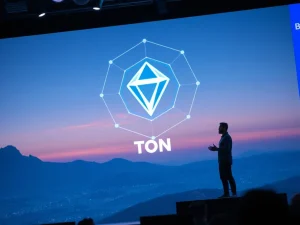Fetch.ai and Ocean Protocol: Breakthrough Agreement Averts Legal War Over $120M FET Tokens

The cryptocurrency landscape often sees rapid developments. Few events, however, capture attention like a high-stakes dispute between major projects. A significant crypto legal dispute involving Fetch.ai and Ocean Protocol recently reached a pivotal agreement. This breakthrough prevents a full-blown legal battle over a substantial sum of FET tokens. The resolution offers a critical lesson in navigating complex blockchain collaborations. Investors and enthusiasts alike closely watched this unfolding drama. Ultimately, the outcome highlights the growing maturity of the decentralized ecosystem.
Unpacking the $120 Million FET Tokens Controversy
The core of the disagreement centered on allegations of a massive token transfer. Specifically, Fetch.ai claimed the Ocean Protocol Foundation sold 286 million FET tokens. These tokens were valued at approximately $120 million at the time of the alleged transaction. This action reportedly occurred during the merger period of the Artificial Superintelligence Alliance (ASI). Blockchain data platform Bubblemaps highlighted these transfers. It showed an Ocean Protocol-linked multisignature wallet converted 661 million Ocean tokens into the 286 million FET coins. Furthermore, these transfers included 160 million FET tokens sent to Binance and 109 million to GSR Markets. This data fueled the initial concerns and subsequent claims from Fetch.ai. The situation created considerable tension within the decentralized AI community. Transparency in such large-scale operations remains paramount.
Ocean Protocol Agrees to Return Tokens, Ending Legal Threat
A resolution now appears firmly in sight. Fetch.ai confirmed it would cancel all pending legal claims against the Ocean Protocol Foundation. This hinges on the foundation’s return of the disputed 286 million FET tokens. Humayun Sheikh, Fetch.ai CEO, publicly stated his commitment to this resolution. During an X Spaces show, he emphasized the simplicity of the offer. “Give my community back the tokens. I will drop every legal claim,” Sheikh declared. He also offered to cover legal costs for the formal agreement. GeoStaking, a FET-based validator node, played a crucial role in brokering this potential deal. They confirmed Ocean Protocol’s willingness to return the tokens. This is provided Fetch.ai’s offer becomes official. Sheikh indicated a formal proposal could materialize very soon. This agreement marks a significant step towards resolving misunderstandings. It avoids a potentially damaging and costly lawsuit for both entities. Cooperation often yields better results than prolonged conflict.
Navigating the Complexities of a Blockchain Merger
The dispute emerged shortly after the announcement of the Artificial Superintelligence Alliance (ASI) in March 2024. This alliance aimed to combine the strengths of several prominent AI-focused blockchain projects. However, the subsequent withdrawal of Ocean Protocol from the ASI on October 9 added another layer of complexity. Ocean Protocol made no public mention of the token transfers at that time. Fetch.ai CEO Humayun Sheikh had previously offered a $250,000 reward. This reward sought information on signatories of OceanDAO’s multisignature wallet. It also aimed to uncover their connection to the Ocean Protocol Foundation. A blockchain merger of this scale inherently involves intricate financial and governance structures. Multisignature (multisig) wallets, for instance, require multiple approvals for transactions. This design enhances security but can complicate accountability if not managed transparently. The incident underscores the challenges in large-scale decentralized collaborations. Clear governance frameworks are essential for success.
FET Token Price Volatility and Blame Game
The period following the ASI Alliance announcement saw dramatic price movements for the FET token. Its value plummeted over 93% from a peak of $3.22 to approximately $0.26. This significant drop naturally raised concerns among investors and community members. Bruce Pon, founder of Ocean Protocol, offered a counter-narrative regarding the price decline. He argued the drop was unrelated to Ocean Protocol’s actions or its departure from the ASI. Instead, Pon attributed the decline to broader market sentiment and volatility. He also cited “SingularityNet and Fetch’s draining of liquidity…by dumping upwards of $500 million worth of $FET tokens.” Furthermore, Pon mentioned a “reckless TRNR deal that failed to anticipate crypto dropping more than 45%.” Ocean Protocol decided it could not “in good conscience remain a part of the ASI Alliance,” according to Pon. He also promised a detailed, “claim-by-claim rebuttal” to all recent allegations. These differing viewpoints highlight the intense scrutiny surrounding major crypto project developments. Market dynamics play a crucial role in token performance.
The Artificial Superintelligence Alliance: A Future Secured?
The resolution of this specific conflict may pave the way for a more stable future for the Artificial Superintelligence Alliance. Such alliances rely heavily on trust and clear operational agreements. Lingering legal battles could severely hinder progress and investor confidence. The quick action to resolve this dispute demonstrates a commitment to maintaining a positive ecosystem. Both Fetch.ai and Ocean Protocol are significant players in the decentralized AI space. Their ability to find common ground sets a positive precedent. It shows that even complex disagreements can be resolved without protracted legal battles. The focus can now shift back to innovation and development within the alliance. This outcome benefits the entire community. It reinforces the collaborative spirit of Web3.
Conclusion: A Precedent for Crypto Legal Dispute Resolution
The impending agreement between Fetch.ai and Ocean Protocol represents a significant de-escalation. It prevents a protracted and costly crypto legal dispute. This resolution prioritizes community interests and project stability over continued conflict. It also offers valuable insights into the governance challenges within decentralized ecosystems. Both parties now have an opportunity to move forward. This event ultimately reinforces the need for clear communication and robust agreements in blockchain partnerships. The crypto community will closely watch the formalization of this agreement. This situation provides a valuable case study. It highlights the importance of dialogue and compromise in the fast-evolving world of cryptocurrency. Such resolutions are vital for the industry’s long-term growth and adoption.








